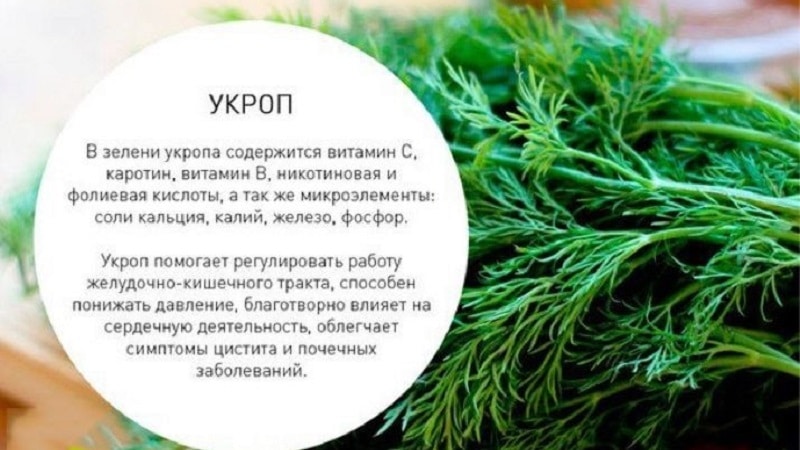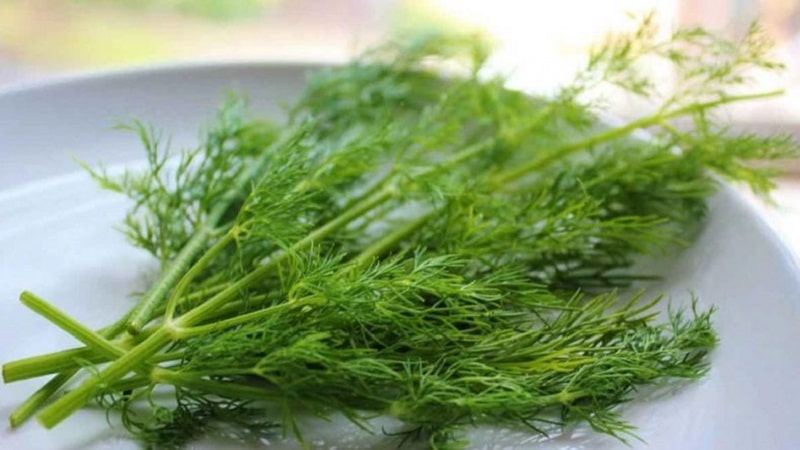What vitamins are contained in dill - chemical composition and beneficial properties of the plant
Dill fragrant - a popular plant with a strong, distinctive odor, from which grass and seeds are collected. Thanks to its rich chemical composition, it is used in cosmetology for skin care, official and folk medicine for auxiliary treatment and prevention of many diseases, and aromatherapy for relaxation.
Chemical composition of dill seeds
Nutritional value of 100 g of seeds:
- proteins - 16 g;
- fats - 14.5 g;
- carbohydrates - 34.1 g;
- water - 8 g;
- dietary fiber - 21.1 g;
- calorie content - 405 kcal.
The fruits contain:
- vitamins A, C, PP, group B;
- iron;
- zinc;
- copper;
- manganese;
- selenium;
- essential amino acids;
- fatty oil (93% consists of fatty acids);
- essential oil;
- coumarins;
- flavonoid vicenin;
- chlorogenic and caffeic acids;
- fiber.
Due to the high content of phytoncides, the seeds are used as preservatives.

What vitamins and minerals are contained in dill?
Nutritional value per 100 g of greens:
- proteins - 2.5 g;
- fats - 0.5 g;
- carbohydrates - 6.3 g;
- dietary fiber - 2.8 g;
- water - 86 g;
- calorie content - 40 kcal.
What is contained in dill:
- vitamins A, C, E, H, K, PP, group B;
- potassium;
- chlorine;
- sodium;
- silicon;
- calcium;
- phosphorus;
- magnesium;
- sulfur;
- saturated and polyunsaturated fatty acids;
- essential oil;
- flavonoids (quercetin, kaempferol, etc.).
Beneficial healing properties
In medicine are valuable all parts of the plant, but the seeds are especially widely used. In particular, they:
- increase blood formation;
- have vasoconstrictive, diuretic, antispasmodic, detoxifying and expectorant effects;
- improve digestion, help with flatulence;
- promote bile production;
- calm down;
- increase appetite.
For women
The benefits of dill for women:
- normalization of the menstrual cycle, relief of pain;
- eliminating unpleasant symptoms during menopause: treating hot flashes, improving sleep, getting rid of anxiety;
- strengthening and improving the condition of hair and nails;
- strengthening of the skeleton;
- relieving headaches;
- normalization of appetite;
- improvement of visual functions;
- regulation of the gastrointestinal tract;
- removal of toxins from the body;
- wound healing;
- choleretic and diuretic effects.
Use of dill by pregnant women women reduces the likelihood of muscle cramps, helps strengthen the immune system and the proper development of the fetus, but the plant should not be consumed in large quantities so as not to cause uterine contractions. If there are no contraindications, you can only add the herb to dishes as a spice.
Important! Dill infusion may stimulate the onset of the menstrual cycle during a delay and reduce the symptoms of dysmenorrhea, but studies have not proven the plant's effectiveness.
Plant seeds reduce anxiety during childbirth and shorten its duration.
During breastfeeding herbal decoction eliminates colic and bloating in the baby, stimulates the secretion of breast milk. If a woman does not have problems with blood pressure, the plant can be introduced into the diet 10 days after birth.

For men
The elements that make up dill have on the male body a number of positive actions:
- iron normalizes hemoglobin levels in the blood and stimulates metabolic processes;
- zinc helps in the fight against diseases associated with the genitourinary system;
- vitamin C improves metabolism;
- potassium has an antiarrhythmic effect;
- omega-3 and omega-6 eliminate various inflammations and strengthen blood vessels;
- organic acids and flavonoids have antioxidant properties.
Useful properties of the plant for men:
- removal of toxins from the body;
- calming effect: normalization of sleep, elimination of depression and depression;
- analgesic effect;
- elimination of inflammation of the organs of vision;
- improving the functioning of the gastrointestinal tract;
- suppression of pathogenic microflora;
- eliminating bad breath;
- regulation of cholesterol and blood sugar levels;
- strengthening bone tissue;
- increasing potency by strengthening blood vessels;
- prevention of kidney and liver diseases, prostatitis;
- auxiliary treatment in the initial stages of hypertension, angina pectoris;
- potential antitumor activity.
For the elderly
Benefits of the plant for older people:
- strengthening bone tissue;
- prevention of osteoporosis;
- normalization of pressure;
- eliminating flatulence;
- regulation of the kidneys and gall bladder.
For children
With the permission of the pediatrician, dill infusion is given to children from 8 months. He relieves colic and bloating, improves appetite, promotes the production of digestive enzymes.
The plant consolidates the results of treatment of anemia, pyelonephritis, cystitis.
Basic rules and norms of use
Standard dosages:
- For men - no more than 25 g per day (5-10 g with each meal). It is recommended to add seeds to soups (1 g per serving).
- Women - from 25 to 30 g per day.
- Children - inclusion in the diet from the age of 8 months (no more than 5 g per day). The daily norm for children from 1.5 years is 10 g.
Excessive consumption of greens leads to unpleasant consequences:
- general weakness;
- possible deterioration of visual functions;
- drowsiness;
- intestinal dysfunction.
Contraindications
Dill is not recommended for use in the following cases:
- individual intolerance;
- pregnancy (prohibited in large quantities);
- arterial hypotension.
Conclusion
Dill is a useful spicy herb that is used not only in cooking, but also in medicine to improve the functioning of the gastrointestinal tract, treat hypertension, and insomnia. When consuming the plant, it is important to follow the recommended dosage so as not to cause harm to health.